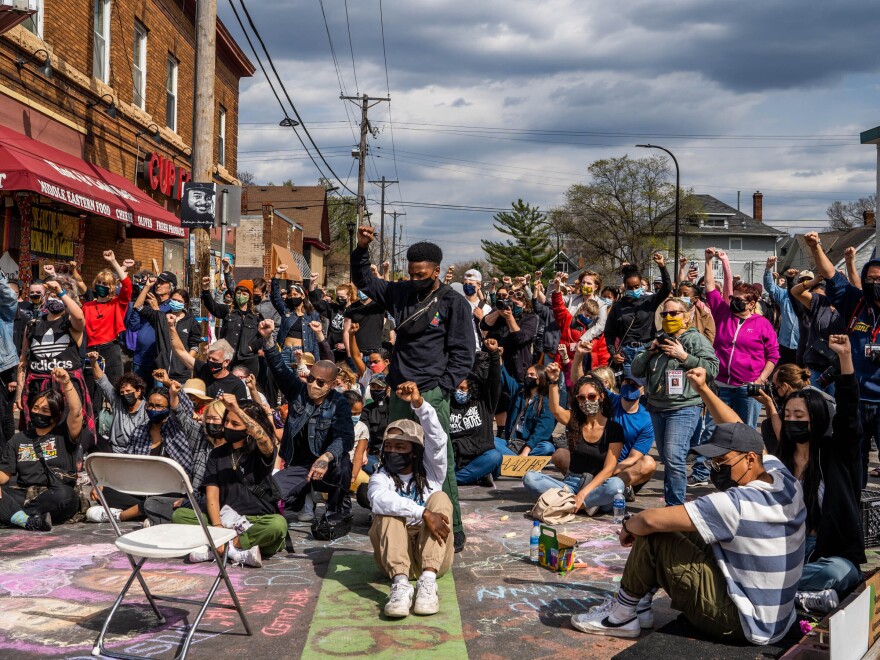A strange, tense springtime has come to the Twin Cities as residents and law enforcement alike brace for a verdict in the intensely watched trial of fired police officer Derek Chauvin over the death of George Floyd.
The Hennepin County courthouse in downtown Minneapolis, where the trial is taking place, has become a fortress, surrounded by tall fences topped with barbed wire.
Inside, the trial that has gripped Minneapolis for weeks is nearing its conclusion. Both the prosecution and the defense made closing arguments Monday. The jury will then go into sequestration at a local hotel, avoiding contact with the outside world as they deliberate the three charges that Chauvin faces: second- and third-degree murder, and second-degree manslaughter.
Outside the courthouse, downtown is a maze of concrete barriers and boarded-up buildings. Military-style vehicles are stationed on street corners. National Guard troops, deployed by the hundreds, are on armed patrol.
In anticipation of protests and unrest over any verdict — especially an acquittal — law enforcement had already dramatically ramped up its presence by the time jury selection began last month.
Now, law enforcement has intensified even further after a week of protests over the police shooting death of 20-year-old Daunte Wright in the Minneapolis suburb of Brooklyn Center. Police officials there said the officer who shot Wright mistook her handgun for her Taser. More than 200 people were arrested over the course of the week, authorities said.
"We stand on the brink of a historic week in our state and in our country, and certainly for the policing profession," said Col. Matt Langer, chief of the Minnesota State Patrol, today at a press conference where law enforcement officials gathered with community organizers to urge protesters to remain peaceful.

The Minnesota National Guard activated an additional 2,500 troops this week, bringing the total number to more than 3,000. The state patrols in Ohio and Nebraska are sending more than 120 officers to Minnesota for assistance.
Minneapolis Public Schools, which only recently reopened in-person classes for some students, announced Friday that it will send students home for remote learning Wednesday through Friday this week and will cancel all after-school programs those days.
"Our community is moving through an extraordinarily challenging time as we react to the killing of former MPS student Daunte Wright by a Brooklyn Center police officer, just as testimony in the trial of former officer Derek Chauvin in the death of George Floyd concludes and the case goes to the jury," wrote the superintendent, Ed Graff, in a statement Friday afternoon. "We anticipate that a verdict in the Chauvin case could impact in-person learning in Minneapolis Public Schools."
Many residents of this region, who are no strangers to protests over police killings, say they feel anxious ahead of the verdict.
At a rally Sunday at the intersection of 38th Street and Chicago Avenue, the site of Floyd's death last May, activists and friends and family of people killed in interactions with police took turns speaking to a peaceful crowd that gathered to protest police violence against Black people and the spike in anti-Asian hate incidents.
Takyra Smith, who attended Sunday's rally with her niece, nephew and 4-year-old son, said the trial has been too painful for her to watch, especially the witnesses defending Chauvin's actions in restraining Floyd.
"How could you think that you weren't hurting anybody?" she asked, referring to Chauvin. "To watch that, it's killing me."
The outcry over the death of Floyd began even as officers were still kneeling on him at the busy street corner outside the Cup Foods convenience store at sunset on Memorial Day 2020. Distressed onlookers pulled out their phones to record the incident. The resulting videos went viral within hours.
The giant protests over the weeks that followed drew thousands to memorials and marches across Minneapolis — at the site of Floyd's death, through downtown, on freeways, to the mayor's home. Demonstrators burned down a police station, and businesses across the city reported damage and looting.
In 2016, protests followed a prosecutor's announcement there would be no charges against the officers who shot Jamar Clark, a 24-year-old Black man who was shot by a Minneapolis police officer during a confrontation outside an ambulance as paramedics treated his girlfriend. Some witnesses said Clark was handcuffed when he was shot; police said he was not and had grabbed for one of the officer's guns.
A year later, thousands of protesters marched to the Minnesota State Capitol in St. Paul to protest the acquittal of the police officer who fatally shot Philando Castile during a traffic stop over a broken taillight. Castile, a 32-year-old Black man, disclosed he was legally carrying a gun; the officer, Jeronimo Yanez, shot him five times as Castile's girlfriend and daughter looked on. Jurors deliberated for five days before acquitting Yanez on charges of second-degree manslaughter and dangerous discharge of a firearm.
Concerns about protests and unrest have come up repeatedly in Chauvin's trial.
Defense lawyers have argued that the jury could be reluctant to acquit Chauvin over fears of prompting another round of protests and unrest.
At Monday's closing arguments, prosecutor Steve Schleicher worked to characterize the state's case as "pro-police," framing Chauvin as an out-of-control officer flouting best practices and policy with "indifference" toward Floyd's life.
"To be very clear, this case is called The State of Minnesota v. Derek Chauvin. This case is not called The State of Minnesota v. The Police."
NPR's Leila Fadel in Minneapolis and MPR contributed reporting.
Copyright 2021 NPR. To see more, visit https://www.npr.org.




